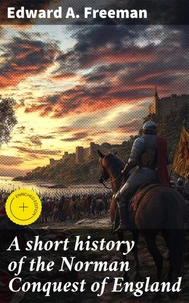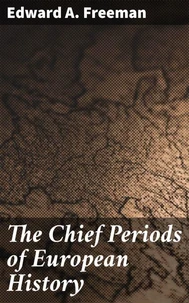William the Conqueror
Par :Formats :
Disponible dans votre compte client Decitre ou Furet du Nord dès validation de votre commande. Le format ePub est :
- Compatible avec une lecture sur My Vivlio (smartphone, tablette, ordinateur)
- Compatible avec une lecture sur liseuses Vivlio
- Pour les liseuses autres que Vivlio, vous devez utiliser le logiciel Adobe Digital Edition. Non compatible avec la lecture sur les liseuses Kindle, Remarkable et Sony
 , qui est-ce ?
, qui est-ce ?Notre partenaire de plateforme de lecture numérique où vous retrouverez l'ensemble de vos ebooks gratuitement
Pour en savoir plus sur nos ebooks, consultez notre aide en ligne ici
- Nombre de pages141
- FormatePub
- ISBN859-65--4736854-0
- EAN8596547368540
- Date de parution16/09/2022
- Protection num.Digital Watermarking
- Taille483 Ko
- Infos supplémentairesepub
- ÉditeurDIGICAT
Résumé
In "William the Conqueror, " Edward A. Freeman delivers a comprehensive examination of one of history's most pivotal figures, exploring the life and reign of William I of England. Freeman's meticulous narrative combines biographical detail with socio-political analysis, set against the backdrop of 11th-century Europe. The book interlaces historical fact with vibrant prose, eschewing dry academic language for a style that reflects Freeman's deep passion for history, making it accessible yet intellectually rigorous.
His exploration delves into William's strategies, battles, and the socio-cultural transformations sparked by the Norman Conquest, contributing to a richer understanding of medieval England's fabric. Edward A. Freeman was a prominent historian and advocate of rational historical analysis. His extensive educational background and engagement with contemporary historians influenced his approach to writing this biography.
Freeman's dedication to uncovering the nuances of the past stemmed from a desire to inform readers about the significance of historical events and figures, particularly those whose legacies have dramatically shaped the course of nations. His scholarly work reflects a commitment to vibrant storytelling grounded in thorough research. This book is an essential read for those interested in understanding the formidable impact of William the Conqueror on Britain's history.
Freeman's expert insights and compelling narrative invite readers to appreciate the complexities of conquest and governance, making it a vital resource for both scholars and history enthusiasts alike.
His exploration delves into William's strategies, battles, and the socio-cultural transformations sparked by the Norman Conquest, contributing to a richer understanding of medieval England's fabric. Edward A. Freeman was a prominent historian and advocate of rational historical analysis. His extensive educational background and engagement with contemporary historians influenced his approach to writing this biography.
Freeman's dedication to uncovering the nuances of the past stemmed from a desire to inform readers about the significance of historical events and figures, particularly those whose legacies have dramatically shaped the course of nations. His scholarly work reflects a commitment to vibrant storytelling grounded in thorough research. This book is an essential read for those interested in understanding the formidable impact of William the Conqueror on Britain's history.
Freeman's expert insights and compelling narrative invite readers to appreciate the complexities of conquest and governance, making it a vital resource for both scholars and history enthusiasts alike.
In "William the Conqueror, " Edward A. Freeman delivers a comprehensive examination of one of history's most pivotal figures, exploring the life and reign of William I of England. Freeman's meticulous narrative combines biographical detail with socio-political analysis, set against the backdrop of 11th-century Europe. The book interlaces historical fact with vibrant prose, eschewing dry academic language for a style that reflects Freeman's deep passion for history, making it accessible yet intellectually rigorous.
His exploration delves into William's strategies, battles, and the socio-cultural transformations sparked by the Norman Conquest, contributing to a richer understanding of medieval England's fabric. Edward A. Freeman was a prominent historian and advocate of rational historical analysis. His extensive educational background and engagement with contemporary historians influenced his approach to writing this biography.
Freeman's dedication to uncovering the nuances of the past stemmed from a desire to inform readers about the significance of historical events and figures, particularly those whose legacies have dramatically shaped the course of nations. His scholarly work reflects a commitment to vibrant storytelling grounded in thorough research. This book is an essential read for those interested in understanding the formidable impact of William the Conqueror on Britain's history.
Freeman's expert insights and compelling narrative invite readers to appreciate the complexities of conquest and governance, making it a vital resource for both scholars and history enthusiasts alike.
His exploration delves into William's strategies, battles, and the socio-cultural transformations sparked by the Norman Conquest, contributing to a richer understanding of medieval England's fabric. Edward A. Freeman was a prominent historian and advocate of rational historical analysis. His extensive educational background and engagement with contemporary historians influenced his approach to writing this biography.
Freeman's dedication to uncovering the nuances of the past stemmed from a desire to inform readers about the significance of historical events and figures, particularly those whose legacies have dramatically shaped the course of nations. His scholarly work reflects a commitment to vibrant storytelling grounded in thorough research. This book is an essential read for those interested in understanding the formidable impact of William the Conqueror on Britain's history.
Freeman's expert insights and compelling narrative invite readers to appreciate the complexities of conquest and governance, making it a vital resource for both scholars and history enthusiasts alike.




